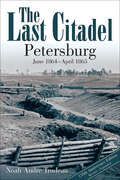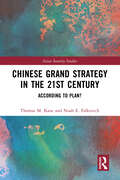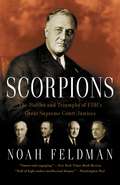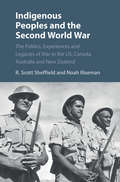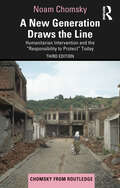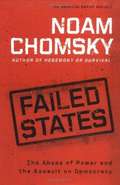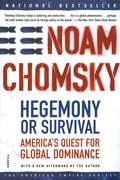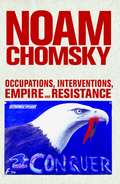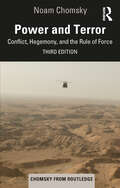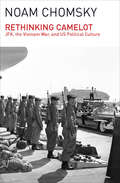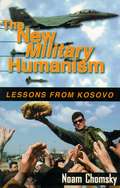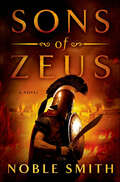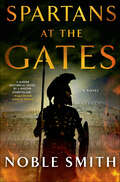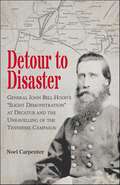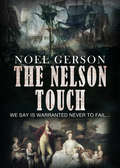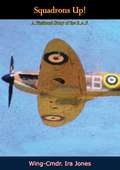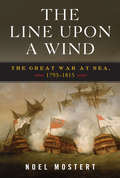- Table View
- List View
The Last Citadel: Petersburg, June 1864–April 1865
by Noah Andre TrudeauThe revised and updated groundbreaking study of the most extensive military operation of the Civil War—from the author of Bloody Roads South.The Petersburg campaign began on June 9, 1864, and ended on April 3, 1865, when Federal troops at last entered the city. It was the longest and most costly siege ever to take place on North American soil, yet it has been overshadowed by other actions that occurred at the same time period, most notably Sherman’s famous “March to the Sea,” and Sheridan’s celebrated Shenandoah Valley campaign. The ten-month Petersburg affair witnessed many more combat actions than the other two combined, and involved an average of 170,000 soldiers, not to mention thousands of civilians who were also caught up in the maelstrom. By its bloody end, the Petersburg campaign would add more than 70,000 casualties to the war’s total.With the same dogged determination that had seen him through the terrible Overland Campaign, Lieutenant General Ulysses S. Grant fixed his sights on the capture of Petersburg. Grant’s opponent, General Robert E. Lee, was equally determined that the “Cockade City” would not fall. Trudeau crafts this dramatic and moving story largely through the words of the men and women who were there, including officers, common soldiers, and the residents of Petersburg. What emerges is an epic account rich in human incident and adventure. Based on exhaustive research into official records and unpublished memoirs, letters, and diaries, as well as published recollections and regimental histories, The Last Citadel also includes twenty-three maps and a choice selection of drawings by on-the-spot combat artists.
Chinese Grand Strategy in the 21st Century: According to Plan? (Asian Security Studies)
by Thomas M. Kane Noah FalkovichThis book examines the state of China’s grand strategy in the 21st century, including political, military and economic factors. Over the past two decades, the People’s Republic of China (PRC) has attained the second highest gross domestic product in the world, taken a leadership role in East Asian regional organisations and substantially improved its military capabilities. Each of these developments – and many others like them – have attracted attention from scholars, journalists and policymakers. Less frequently acknowledged – but perhaps of greater significance – is the impressive congruence of Beijing’s accomplishments. This book highlights how the PRC’s successes support one another and pave the way for future accomplishments, and how these successes seem to be achieved in an unusually coherent and purposeful way. As Beijing’s relations with the rest of the world continue to evolve, with events ranging from the ongoing global economic crisis to the turbulence in China’s own stock market which may bring the PRC’s government under pressure to re-order its priorities, this book assesses China’s grand strategy and long-term approach to national policy. It identifies the political, military and economic instruments it is likely to use, the key challenges which it will face, and explores the implications for the global community. This book will be of great interest to students of Chinese politics, foreign policy, strategic studies, international security and IR in general.
Scorpions: The Battles and Triumphs of FDR's Great Supreme Court Justices
by Noah FeldmanA tiny, ebullient Jew who started as America's leading liberal and ended as its most famous judicial conservative. A Klansman who became an absolutist advocate of free speech and civil rights. A backcountry lawyer who started off trying cases about cows and went on to conduct the most important international trial ever. A self-invented, tall-tale Westerner who narrowly missed the presidency but expanded individual freedom beyond what anyone before had dreamed. Four more different men could hardly be imagined. Yet they had certain things in common. Each was a self-made man who came from humble beginnings on the edge of poverty. Each had driving ambition and a will to succeed. Each was, in his own way, a genius. They began as close allies and friends of FDR, but the quest to shape a new Constitution led them to competition and sometimes outright warfare. SCORPIONS tells the story of these four great justices: their relationship with Roosevelt, with each other, and with the turbulent world of the Great Depression, World War II, and the Cold War. It also serves as a history of the modern Constitution itself.
Living with No Excuses: The Remarkable Rebirth of an American Soldier
by Noah GallowayMilitary hero and beloved Dancing with the Stars alum Noah Galloway shares his life story, and how losing his arm and leg in combat forced him to relearn how to live--and live to the fullest.Inspirational, humorous, and thought provoking, Noah Galloway's LIVING WITH NO EXCUSES sheds light on his upbringing in rural Alabama, his military experience, and the battle he faced to overcome losing two limbs during Operation Iraqi Freedom. From reliving the early days of life to his acceptance of his "new normal" after losing his arm and leg in combat, Noah reveals his ambition to succeed against all odds. Noah's gripping story is a shining example that with laughter, and the right amount of perspective, you can tackle anything. Whether it be overcoming injury, conquering the Dancing with the Stars ballroom, or taking the next steps forward in life with his young family - Noah demonstrates how to live life to the fullest, with no excuses.
Indigenous Peoples and the Second World War: The Politics, Experiences and Legacies of War in the US, Canada, Australia and New Zealand
by R. Scott Sheffield Noah RisemanDuring the Second World War, Indigenous people in the United States, Australia, New Zealand and Canada mobilised en masse to support the war effort, despite withstanding centuries of colonialism. Their roles ranged from ordinary soldiers fighting on distant shores, to soldiers capturing Japanese prisoners on their own territory, to women working in munitions plants on the home front. R. Scott Sheffield and Noah Riseman examine Indigenous experiences of the Second World War across these four settler societies. Informed by theories of settler colonialism, martial race theory and military sociology, they show how Indigenous people and their communities both shaped and were shaped by the Second World War. Particular attention is paid to the policies in place before, during and after the war, highlighting the ways that Indigenous people negotiated their own roles within the war effort at home and abroad.
Pride in Defence: The Australian Military and LGBTI Service since 1945
by Noah Riseman Shirleene RobinsonSince the Second World War the Australian military has undergone remarkable transformations in the way it has treated lesbian, gay, bisexual, transgender and intersex service members: it has shifted from persecuting, hunting and discharging LGBTI members to embracing them as valued members who enhance the Force's capabilities. LGBTI people have served in the Australian military since its very beginnings, yet Australian Defence Force histories have been very slow to recognise this. Pride in Defence confronts that silence. It charts the changing policies and practices of the ADF, illuminating the experiences of LGBTI members in what was often a hostile institution. Drawing on over 140 interviews and previously unexamined documents, Pride in Defence features accounts of secret romances, police surveillance and traumatic discharges. At its centre are the courageous LGBTI members who served their country in the face of systemic prejudice. In doing so, they showed the power of diversity and challenged the ADF to make it a far stronger institution.
A Daily Creativity Journal
by Noah ScalinThis inspiring journal featuring hundreds of project prompts will help you unlock your creativity with a year of daily artmaking!The concept of Noah Scalin’s “365 method” is simple but inspired: Choose a theme or medium, then make something with it every day for a year. Noah made 365 skull-themed projects . . . now he invites you to choose your obsession and get creative!A Daily Creative Journal offers 365 project prompts to kick start your creativity. It offers tips on how to choose your subject and document your work, plus examples from other artists and crafters who took the 365 challenge. It also introduces new techniques to incorporate into your projects, including quilling, clay-making, paper pop-up engineering, and more. With 365: A Daily Creativity Journal you’ll see how making something every day can change your creative process—and your life—forever!
The Crime of Aggression: The Quest for Justice in an Age of Drones, Cyberattacks, Insurgents, and Autocrats (Human Rights and Crimes against Humanity #36)
by Noah WeisbordA gripping behind-the-scenes account of the dramatic legal fight to hold leaders personally responsible for aggressive warOn July 17, 2018, starting an unjust war became a prosecutable international crime alongside genocide, crimes against humanity, and war crimes. Instead of collective state responsibility, our leaders are now personally subject to indictment for crimes of aggression, from invasions and preemptions to drone strikes and cyberattacks. The Crime of Aggression is Noah Weisbord’s riveting insider’s account of the high-stakes legal fight to enact this historic legislation and hold politicians accountable for the wars they start.Weisbord, a key drafter of the law for the International Criminal Court, takes readers behind the scenes of one of the most consequential legal dramas in modern international diplomacy. Drawing on in-depth interviews and his own invaluable insights, he sheds critical light on the motivations of the prosecutors, diplomats, and military strategists who championed the fledgling prohibition on unjust war—and those who tried to sink it. He untangles the complex history behind the measure, tracing how the crime of aggression was born at the Nuremberg trials only to fall dormant during the Cold War, and he draws lessons from such pivotal events as the collapse of the League of Nations, the rise of the United Nations, September 11, and the war on terror.The power to try leaders for unjust war holds untold promise for the international order, but also great risk. In this incisive and vitally important book, Weisbord explains how judges in such cases can balance the imperatives of justice and peace, and how the fair prosecution of aggression can humanize modern statecraft.
A New Generation Draws the Line: Humanitarian Intervention and the “Responsibility to Protect” Today (Chomsky from Routledge)
by Noam ChomskyIn this work, Chomsky explores the West’s uses and abuses of the principle of "human intervention." An updated foreword by Jean Bricmont explores the ongoing crises of humanitarian intervention in Afghanistan, Libya, Palestine, Syria, and Ukraine and reaffirms Chomsky’s excoriating critiques of Western foreign policy.Chomsky dissects the meaning and uses of humanitarian intervention grounded in the so-called "right to protect" (R2P). In doing so, Chomsky demonstrates how the principle of human intervention has been used as an instrument to justify military intervention in support of Western foreign policy aims. Through detailed case studies of the humanitarian intervention in East Timor and Kosovo, Chomsky also highlights how "humanitarian intervention" often leads to further atrocities and egregious abuses of human rights.As the question of humanitarian intervention looms ever larger, particularly with regard to the Middle East and Eastern Europe, this book is a vital overview of humanitarian intervention and its uses and abuses.
Failed States: The Abuse of Power and the Assault on Democracy
by Noam ChomskyTHE WORLD'S FOREMOST CRITIC OF U.S. FOREIGN POLICY EXPOSES THE HOLLOW PROMISES OF DEMOCRACY IN U-S. ACTIONS ABRoAD -AND AT HOME THE UNITED STATES HAS REPEATEDLY asserted its right to intervene militarily against "failed states" around the globe. In this muchanticipated follow-up to his international bestseller Hegemony or Survival, Noam Chomsky turns the tables, showing how the United States itself shares features with other failed states and therefore is increasingly a danger to its own people and the world. Failed states, Chomsky writes, are those that are unable or unwilling "to protect their citizens from violence and perhaps even destruction" and "regard themselves as beyond the reach of domestic or international law." Though they may have democratic forms, Chomsky notes, failed states suffer from a serious "democratic deficit" that deprives their democratic institutions of real substance. Exploring the latest developments in U.S. foreign and domestic policy, Chomsky reveals Washington's plans to further militarize the planet greatly increasing the risks of nuclear war; assesses the dangerous consequences of the occupation of Iraq, which has fueled global outrage at the United States; documents Washington's self-exemption from international norms, including the UN Charter and the Geneva Conventions, the foundations of contemporary international law, and the Kyoto Protocol; and examines how the U.S. electoral system is designed to eliminate genuine political alternatives, impeding any meaningful democracy.
Hegemony or Survival: America's Quest for Global Dominance
by Noam ChomskyAn immediate national bestseller, Hegemony or Survival demonstrates how, for more than half a century the United States has been pursuing a grand imperial strategy with the aim of staking out the globe. Our leaders have shown themselves willing-as in the Cuban missile crisis-to follow the dream of dominance no matter how high the risks. World-renowned intellectual Noam Chomsky investigates how we came to this perilous moment and why our rulers are willing to jeopardize the future of our species. With the striking logic that is his trademark, Chomsky tracks the U.S. government's aggressive pursuit of "full spectrum dominance" and vividly lays out how the most recent manifestations of the politics of global control-from unilateralism to the dismantling of international agreements to state terrorism-cohere in a drive for hegemony that ultimately threatens our existence. Lucidly written, thoroughly documented, and featuring a new afterword by the author, Hegemony or Survival is a definitive statement from one of today's most influential thinkers.
Making the Future: Occupations, Interventions, Empire and Resistance
by Noam ChomskyMaking the Future presents more than fifty concise and persuasively argued commentaries on U.S. politics and policies, written between 2007 and 2011. Taken together, Chomsky's essays present a powerful counter-narrative to official accounts of the major political events of the past four years: the wars in Afghanistan and Iraq; the U.S. presidential race; the ascendancy of China; Latin America's leftward turn; the threat of nuclear proliferation in Iran and North Korea; Israel's invasion of Gaza and expansion of settlements in Jerusalem and the West Bank; developments in climate change; the world financial crisis; the Arab Spring; the assassination of Osama bin Laden; and the Occupy protests. Laced throughout his critiques are expressions of commitment to democracy and the power of popular struggles. "Progressive legislation and social welfare," writes Chomsky, "have been won by popular struggles, not gifts from above. Those struggles follow a cycle of success and setback. They must be waged every day, not just once every four years, always with the goal of creating a genuinely responsive democratic society, from the voting booth to the workplace." Making the Future is a follow-up to Interventions, published by City Lights in 2007 and banned from Guantánamo Bay by U.S. military censors. Both books are drawn from articles Chomsky has been writing regularly for the New York Times Syndicate, but which go largely ignored by newspapers in the United States. Making the Future offers fierce, accessible, timely, gloves-off political writing by one of America's foremost intellectual and political dissidents.
Power and Terror: Conflict, Hegemony, and the Rule of Force (Chomsky from Routledge)
by Noam ChomskyIn this pertinent book, Noam Chomsky examines the imbalanced dynamics of international power relations and the use of state terror by the United States and other Western powers in the Middle East in the post-9/11 era. This edition features new forewords by Fred Branfman and Chris Hedges reasserting the enduring importance of Chomsky’s work and extending Chomsky’s analysis to recent developments in the Middle East.Chomsky explores international relations since World War II to demonstrate that contemporary acts of terrorism cannot be understood outside the context of Western power and state terror throughout the world, particularly in the Middle East. In doing so, Chomsky demonstrates that state terror is intrinsic to U.S. foreign policy and fundamental in the maintenance of Western hegemony throughout the so-called War on Terror, including throughout the Obama administration.This new edition offers a vital critique of U.S. foreign policy and its reliance on acts of terror to maintain its hegemony in the Middle East. It will therefore be vital reading for those who wish to understand the grim realities of Western foreign policy.
Rethinking Camelot: JFK, the Vietnam War, and U.S. Political Culture
by Noam ChomskyThe famed political critic &“analyzes the issue most prominently posed in Oliver Stone&’s film JFK . . . strong arguments against Kennedy mythologists&” (Publishers Weekly). Rethinking Camelot is a thorough analysis of John F. Kennedy&’s role in the US invasion of Vietnam and a probing reflection on the elite political culture that allowed and encouraged the Cold War. In it, Chomsky dismisses efforts to resurrect Camelot—an attractive American myth portraying JFK as a shining knight promising peace, foiled only by assassins bent on stopping this lone hero who would have unilaterally withdrawn from Vietnam had he lived. Chomsky argues that US institutions and political culture, not individual presidents, are the key to understanding US behavior during Vietnam. Rethinking Camelot is &“an interesting work not only for the history it explores, but also as a study of how various individuals and groups write and interpret history&” (Choice). Praise for Noam Chomsky &“Chomsky is a global phenomenon . . . perhaps the most widely read voice on foreign policy on the planet.&” —The New York Times Book Review &“The conscience of the American people.&” —New Statesman &“Reading Chomsky is like standing in a wind tunnel. With relentless logic, Chomsky bids us to listen closely to what our leaders tell us—and to discern what they are leaving out . . . The questions Chomsky raises will eventually have to be answered. Agree with him or not, we lose out by not listening.&” —Business Week &“One of the radical heroes of our age . . . a towering intellect . . . powerful, always provocative.&” —The Guardian
The New Military Humanism: Lessons From Kosovo
by Noam ChomskyAnalyzing the NATO bombing, Chomsky challenges the New Humanism: Is it guided by power interests, or by humanitarian concern? Is the resort to force undertaken in the name of principles and values? Or are we witnessing something more crass and familiar?
Sons of Zeus: A Novel (Nikias of Plataea #1)
by Noble SmithIn 431 B.C., Ancient Greece experienced its own "Pearl Harbor"—a treacherous sneak attack that would mark the start of the bloody war between the democracy of Athens and the tyranny of Sparta. Caught between these superpowers, the independent city-state of Plataea became the arena where their battle for control of all of Greece would begin.In Plataea, the young Greek warrior Nikias dreams of glory in the Olympic games as he trains for the pankration—the no-holds-barred ultimate fighting of the era—until an act of violence in defense of his beloved threatens to send him into exile. But before his trial can take place, a traitor opens the city gates to a surprise attack force.Suddenly trapped inside their own fortress, the Plataeans are fighting for their lives. As Nikias seeks to discover the identity of the man who betrayed the city, he makes a daring escape, gathers an army, and leads this ragtag band into a suicidal battle at the gates of the citadel—a battle that will decide the fates of his family, his friends, and the woman he loves.In the vein of Bernard Cornwell, Conn Iggulden, and Steven Pressfield, Sons of Zeus marks the beginning of a richly detailed new action-adventure series.
Spartans at the Gates: A Novel (Nikias of Plataea #2)
by Noble SmithThe Peloponnesian War has begun. An army of merciless Spartan invaders have arrived at the gates of Plataea, bent on obliterating the independent city-state and its inhabitants. Plataea's oldest allies, the Athenians, are spread too thin in their own campaigns to send help. Cut off and alone, the Plataeans have dug in behind their high walls for the coming attack, while the tyrannical Spartans prepare to lay siege.On a rugged mountain road, a young Plataean warrior named Nikias rides to Athens on an urgent quest. He carries with him a bag of ill-gotten gold, hoping to raise an army of mercenaries to help defend his citadel from the Spartan assault. But in the sprawling stronghold of Athens, Nikias encounters perils that prove to be more dangerous than those he has faced on the battlefield. Noble Smith's Spartans at the Gates transports us to the dawn of one of history's most famous wars--a fight that would tear apart the great powers of ancient Greece.
The War of the Running Dogs: How Malaya Defeated The Communist Guerrillas, 1948-1960 (Sven Hassel War Classics)
by Noel Barber'The story of the first all-out struggle in Asia between Communism and the West, vividly told in an exciting and engrossing book' Sunday ExpressOnly three short years after the end of the Japanese occupation, war came again to Malaya. The Chinese-backed guerrillas called it the War of the Running Dogs - their contemptuous term for those in Malaya who remained loyal to the British. The British Government referred to this bloody and costly struggle as the 'Malayan Emergency'. Yet it was a war that lasted twelve years and cost thousands of lives. By the time it was over Malaya had obtained its independence - but on British, not on Chinese or Communist terms. Here is the war as it was. Here are the planters and their wives on their remote rubber estates, the policemen, the generals and the soldiers, the Malays, Chinese and Indians of a polyglot country, all fighting an astute, ruthless, and well organized enemy.
The War of the Running Dogs: Malaya 1948-1960 (W&N Military)
by Noel Barber'The story of the first all-out struggle in Asia between Communism and the West, vividly told in an exciting and engrossing book' Sunday ExpressOnly three short years after the end of the Japanese occupation, war came again to Malaya. The Chinese-backed guerrillas called it the War of the Running Dogs - their contemptuous term for those in Malaya who remained loyal to the British. The British Government referred to this bloody and costly struggle as the 'Malayan Emergency'. Yet it was a war that lasted twelve years and cost thousands of lives. By the time it was over Malaya had obtained its independence - but on British, not on Chinese or Communist terms. Here is the war as it was. Here are the planters and their wives on their remote rubber estates, the policemen, the generals and the soldiers, the Malays, Chinese and Indians of a polyglot country, all fighting an astute, ruthless, and well organized enemy.
Detour to Disaster: General John Bell Hood's "Slight Demonstration" at Decatur and the Unraveling of the Tennessee Campaign
by Noel CarpenterA detailed account of the pivotal decision made by a young army commander to march to Decatur, and the consequential combat that ensued. In October of 1864, Confederate General John Bell Hood set out through Alabama on what would be the final campaign of the Army of Tennessee. One event in particular, overlooked and misunderstood for generations, portended what was to follow and is the subject of Noel Carpenter’s Detour to Disaster: General John Bell Hood’s “Slight Demonstration” at Decatur and the Unravelling of the Tennessee Campaign. In this fascinating and meticulously detailed and documented account—the first book-length study of the weighty decision to march to Decatur and the combat that followed there—Carpenter investigates the circumstances surrounding these matters and how they overwhelmed the controversial young army commander and potentially doomed his daring invasion. Detour to Disaster is required reading for everyone interested in the Western Theater, and especially the doomed Tennessee Campaign.
The Emperor's Sword: Japan vs. Russia in the Battle of Tsushima
by Noel F. Busch"On this one battle rests the fate of our nation. Let every man do his utmost." From the bridge of his flagship, Mikasa, Admiral Togo signaled the beginning of the battle, standing near the forward rail, his body thrust forward in the determined stance of some classic Japanese war god. A tiny, Napoleonic figure-barely five feet, three inches tall, and weighing less than 130 pounds -Togo carried his Zeiss binoculars(one of three pairs in Japan) and wore his magnificent ceremonial sword, its gold-encrusted scabbard nearly touching the deck. The sword was a gift from Togo's deified Emperor, and symbolized Japan's new drive to world power by domination of the Eastern seas. The Japanese Fleet was drawn up in the Strait of Tsushima between Japan and Korea. A long smudge of smoke on the southern horizon signaled the approach of the Imperial Russian Ships. On the outcome of the Battle of Tsushima depended the fate of Japan and-ultimately-the fate of the U.S. Fleet at Pearl Harbor. One hundred years after Trafalgar, on May 27, 1905, Togo met Rozhdestvensky, Imperial Russia against Imperial Japan, with most of the long- range firepower and weight on the Russian side. This battle would decide world policy in the Pacific for decades to come. The Emperor's Sword is a violent chronicle of war and death at sea, of diplomatic intrigue, heroism, cowardice, stupidity, international politics, and individual tragedy. The backbone of the Russian Second Pacific Squadron were four new battleships, top-heavy and slow. The armada totaled forty-two vessels. Many if not most of the seamen were bitterly hostile to their officers; the crews were untrained conscripts. When Rozhdestvensky lined up his squadron to face Togo, he had already survived an eighteen-thousand-mile journey, mutiny, lack of fuel, a shortage of ammunition, and a series of mishaps that had won his armada the name of "the mad dog fleet." Noel Busch weaves the complex strands of history into a gripping, absorbing narrative of The Emperor's Sword. As history, as adventure tale, and as sobering analysis of the part played by hazard in deciding defeat or victory, The Emperor's Sword is a fascinating chronicle by a master historian- storyteller.
The Nelson Touch
by Noel GersonA sweeping novel of love and war based on the infamous, real-life affair between Lord Nelson and Lady Emma Hamilton—from the author of The Highwayman. 1793, Naples. One of the most tempestuous love affairs in history is about to begin. Europe has been shaken by the recent revolution in France, and the old monarchies wage war to stop its flames of rebellion from spreading to their own lands; at the forefront is Britain and the might of the royal navy. With each victory, Horatio Nelson’s status rises: his independent spirit and dash have won him much renown. But it is not enough. After suffering a rare setback, Nelson finds himself in the Bay of Naples on a diplomatic mission where he encounters the ambassador’s wife, Lady Emma Hamilton. In each other, they find the solace missing from both their lives at a moment that could not have been more critical. Together they set tongues wagging across the civilized world with their ardent, open liaison, but their relationship would prove more lasting than any scandal it provoked. Only the death of Nelson could end it . . .
Squadrons Up!: A Firsthand Story of the R.A.F.
by Noel MonksThis book is the story of the two R.A.F. fighter squadrons [1st and 73rd] attached to the Advanced Air Striking Force in France from September, 1939, until the eve of France’s capitulation in June, 1940. Written by the leading war correspondent of the Daily Mail, Noel Monks, “It is above all a study of the personality of air fighters, no two of whom, according to the author, were alike.”—NY Times
The Line Upon a Wind: The Great War at Sea, 1793-1815
by Noel MostertThe thrilling story of Britain's death-struggle with Revolutionary France, wherein Napoleon is checkmated by Nelson's brilliant naval exploits. In February 1793 France declared war on Britain, and for the next twenty-two years the Revolutionary and Napoleonic Wars raged. This was to be the longest, cruelest war ever fought at sea, comparable in scale only to the Second World War. New naval tactics were brought to bear, along with such unheard-of weapons as rockets, torpedoes, and submarines. The war on land saw the rise of the greatest soldier the world had ever known--Napoleon Buonaparte--whose vast ambition was thwarted by a genius he never met in person or in battle: Admiral Horatio Nelson.Noel Mostert's narrative ranges from the Mediterranean to the West Indies, Egypt to Scandinavia, showing how land versus sea was the key to the outcome of these wars. He provides details of ship construction, tactics, and life on board. Above all he shows us the extraordinary characters that were the raw material of Patrick O'Brian's and C. S. Forester's magnificent novels.
Industry and Air Power: The Expansion of British Aircraft Production, 1935-1941 (Studies in Air Power #Vol. 5)
by Sebastian Ritchie Noel Sebastian RitchieThe author begins with a general survey of British aircraft manufacturing in the inter-war period. Policy, production, finance and contracts are examined, and the final chapter is concerned with the mobilization of the aircraft industry in 1939, and the emergency measures of 1940.
